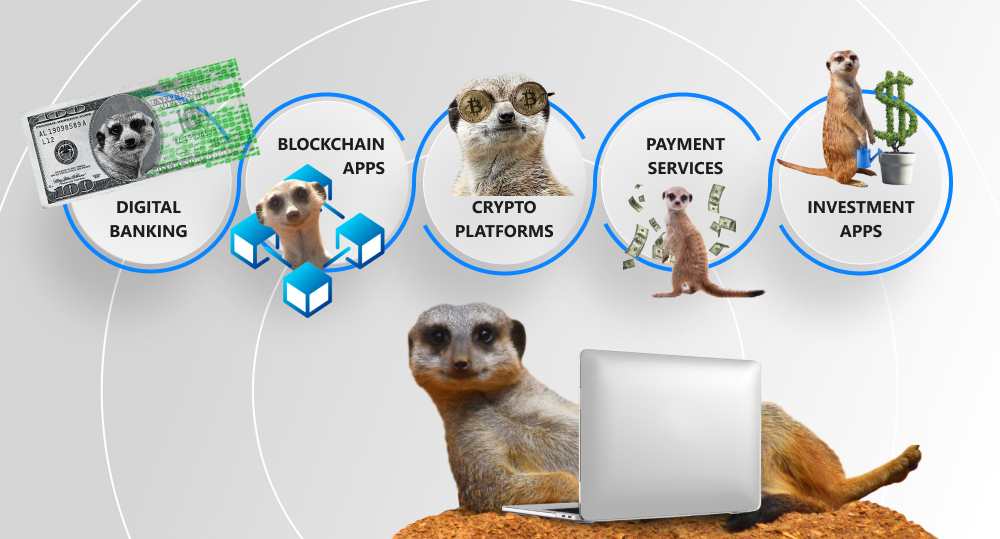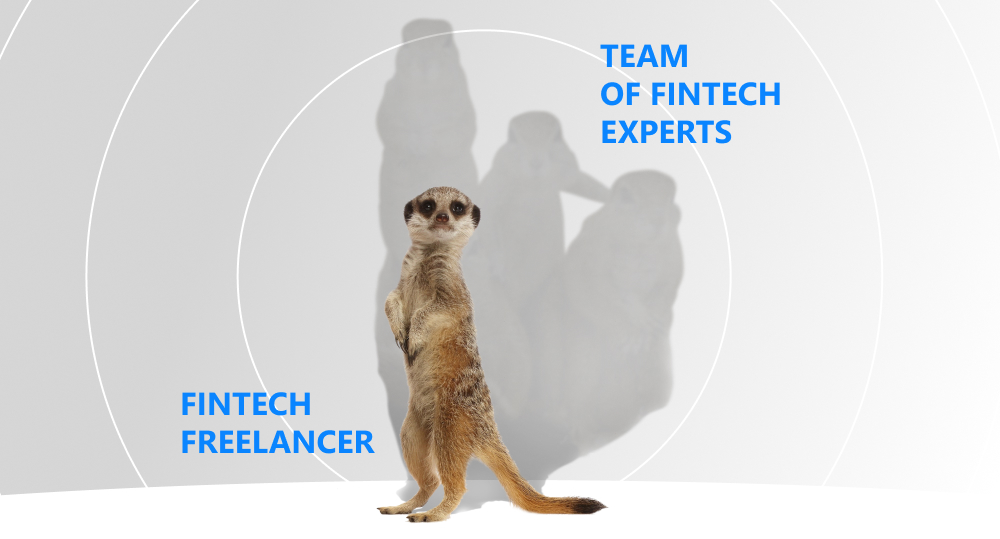Blockchain? SaaS? Neobank? What do these words have in common? Well, they all refer to one of the fastest-growing industries in the world — financial technology. Fintech startups are springing up all over the globe, changing the way we think about financial services. So if you’ve decided to join this community, you probably need to hire fintech developers to stay aligned with current trends in the market.
But where to start your journey, and what to look for in candidates? Fortunately, there are many ways to find true fintech talent. In this article, we'll explore some of the top ones. Are you up for the challenge? Then read on!
written by:
Alexander Arabey
Director of Business Development, Qulix Systems
Blockchain? SaaS? Neobank? What do these words have in common? Well, they all refer to one of the fastest-growing industries in the world — financial technology. Fintech startups are springing up all over the globe, changing the way we think about financial services. So if you’ve decided to join this community, you probably need to hire fintech developers to stay aligned with current trends in the market.
Contents
When to Hire Fintech Software Developers?
Perhaps you are just thinking about starting a fintech business, or you already have your own startup. Either way, you wonder how to speed up product development and bring your innovative solutions to market faster. One of the smartest ways to do this is to hire a fintech developer.
But when is the right time to make such a far-reaching decision? Ask yourself these questions before diving into the hiring process:
- How quickly do you need to launch your new product?
- Do you have enough resources to develop the product all by yourself?
- What is your budget for the development process?
- What is the complexity of your product?
Another factor to consider is the type of product you want to build and offer your customers.
What Types of Products Can a Fintech Developer Build?
With fintech engineers, you get yourself many opportunities to create software solutions that can positively impact people's lives. Here are a few of the most common examples:
Digital Banking Systems
Fintech experts can build comprehensive virtual banking solutions to make transactions more accessible and convenient for everyone. Such digital banking systems empower customers with a wide range of services, including loans, money transfers, investment management, and mobile payments. Using them, banks and other financial institutions can expand their scope of work, introducing a full-scope omnichannel approach to their business and automating many human-driven processes.
One of the most popular digital banking services is mobile banking apps. Such software enables users to securely manage their finances on the go with the help of their smartphone. They can easily check their balance, transfer money, pay bills, monitor spending in real time, and even get a loan without going to a bank.
Blockchain-Based Applications
One of the hottest areas of fintech development right now is blockchain-based apps. Blockchain is the underlying technology behind cryptocurrencies like Bitcoin, but its applications go far beyond digital currencies. Blockchain is a distributed database that allows for secure, transparent, and tamper-proof transactions. This makes it ideal for fintech companies committed to building a wide range of financial services, from payments and money transfers to lending and investments.
Cryptocurrency Platforms
If you're about to start a cryptocurrency company, you won't launch it without quality assistance from fintech programmers. They can help develop a powerful platform that makes it easy for users to buy, sell, and exchange crypto assets. What's more, fintech professionals can be great troubleshooters for non-technical members of your team who are just getting acquainted with this fast-paced fintech sector.
Sounds like exactly what you need? Then you’ve come to the right place. Qulix Systems is currently developing its own crypto trading platform called MintWhale. So if you need the relevant expertise, our team of fintech professionals is at your service.
Payment Services
You're probably a user of one or two payment apps, like Apple Pay or PayPal. They are handy financial technology solutions, these user-friendly digital wallets. If the idea of creating an alternative to them pops into your head, just hire fintech developers to turn it into reality. Digital wallets are extremely convenient for transferring money to different sources, from online marketplaces to distant partners. They guarantee high security for your finances and low risk of manual data entry errors.
Investment Platforms
Hiring fintech developers is a good option for your business if your goal is to create such fintech solutions as investment or trading services. These apps are highly popular with people who are looking to elevate their investment decisions. Using such advanced fintech services, your customers get an easy way to invest in stocks, access the latest analytics, or buy and sell digital currencies like Bitcoin, Ethereum, or Tether.
3 Steps Toward a Dream Fintech Team
Okay, you've decided on the fintech product that your future development team is going to build. Now it's time to move on to the essential steps to make the hiring process for your new fintech talent go more smoothly.
Step #1: Find Your People
First, you have to decide what kind of candidates and how many you are looking for. There is a selection of employment options these days. Here are the most common ones:
In-House Software Developers
In-house fintech developers work in your office day-to-day. Most of them are highly motivated professionals focused on achieving your project's long-term goals. They are easy to get on board, manage, and control. Moreover, they're eager to share their knowledge of developing fintech apps with co-workers.
Any drawbacks?
- Lack of skills for your specific project. It can be hard to find experienced developers who are also familiar with the financial industry. This combination of skills is rare, and professionals with both are in high demand.
- Cost. Since in-house developers are in high demand, they can command a high salary. In addition, you need to factor in the cost of benefits, training, and other expenses.
Hire them if:
- You already have an in-house team of IT specialists, and all you need to reach your dream team is a fintech engineer;
- You can keep a high-cost team;
- You expect a constant flow of new tasks for them;
- You are running a long-term project that requires the same people involved;
- You can easily handle the follow-up bureaucracy.
Freelance Fintech Developers
Hiring a freelance fintech developer is also a popular option to go with. It's perfect for cases when you don't need a whole new gang of programmers. What's more, it's also the most cost-effective alternative to in-house workers. As Website Planet states, hiring remote software developers can save a business $11.6/hour per employee.
Any drawbacks?
- Lack of control. Freelance employees usually work remotely, so you may not have the same level of control over their work as you would with full-time employees.
- No long-term relationship. Freelancers may be less likely to commit to long-term projects or be available for last-minute tasks.
- Higher cost. When working with freelancers, you’re expected to pay for their hours upfront, so you need to weigh the costs and benefits before deciding to hire them.
Hire them if:
- You're a startup owner with a limited budget;
- You want to hire 1–2 employees for a short-term project;
- You already have experience working with freelancers and feel good about it;
- You want to build a remote team.
Bonus tip: some of the best sites to hire fintech developers are Freelancer, Upwork, and Fiverr.
Team of Experienced Fintech Developers
If you’re looking to get into the fintech space, one of the best ways to do so is to hire a dedicated team of skilled fintech app developers. One of the key perks of this option is that you’ll gain access to a group of experts who understand the ins and outs of fintech development, as they’ve worked together on a number of similar projects. This will save you a lot of time and energy that you would otherwise spend trying to figure things out on your own.
Another benefit is that you’ll be able to focus on other aspects of your business while the development team takes care of the technical side. This frees up your time, and you can work on strategy, marketing, and other areas critical to the success of your endeavor.
And one more thing. This cooperation model gives you the opportunity to add other specialists to your team (such as BAs, QA engineers, project managers, etc.) and not be limited to developers only.
Any drawbacks?
- Finding the right team takes time. Fintech is a relatively new field, so there may not be many qualified developers to choose from. But if you devote your time to thorough research, you’ll be rewarded with a group of talented professionals who can help take your business to the next level and beyond.
- Building a quality, ready-to-launch product takes time. Creating good fintech products requires years of experience and multiple team members with different competencies. Which Qulix Systems has, by the way. So before making a final decision, you need to make sure the chosen team meets your business requirements.
Hire them if:
- You're planning to run a large project;
- Your workload is increasing and you need more professionals;
- You don't want to take on the administrative activities and management process;
- You're looking for an established team of professionals with in-depth programming expertise and knowledge of the latest technologies.
Step #2: Check Technical Skills
In the world of fintech, tech stack and relevant experience are essential. Therefore, when screening fintech developers for hire, it's crucial to make sure the team is up-to-date with the latest technology.
The good news is that there are several ways to check this. You can ask them to do a coding task (the language depends on whether you're hiring front-end or back-end developers), take a technical test, or simply ask about their experience with specific technologies.
That said, certain skills are a must for any fintech project:
- Solid knowledge of the subject area
- Strong development expertise
- Cybersecurity proficiency
- Expert data analysis skills
- Knowledge of finance, mathematics, and statistics
- Comprehensive blockchain expertise
Step #3: Assess Soft Skills
In addition to technical expertise, it's also crucial to assess your potential candidates' soft skills. Since fintech is a fast-paced and ever-changing industry, compared to traditional financial services, you should hire adaptable programmers who can work under pressure. The ability to communicate clearly and concisely is a must, as they'll need to find the right words to explain complex concepts to non-technical team members.
Some of the most important soft skills for fintech developers include:
- Ability to multitask
- Strong communication skills
- Risk management
- Adaptability
- Ability to think outside the box
- Problem-solving skills
- Proactivity
To Wrap Things Up
Fintech is a rapidly evolving industry, and with new technologies and trends emerging all the time, it can be challenging to keep up. From early-stage startups to well-established enterprises, stakeholders in the financial field are always striving to find fintech developers who will build a high-quality product.
With the right people on your team, you can take advantage of the latest technology to create innovative financial products and services. And with the help of our guide, you're sure to find world-class developers and achieve your goals.
If you need any further assistance with fintech software development, our dedicated Qulix team is always happy to help. Get in touch with our support team today, and together we'll find the right candidates for your business.

Contacts
Feel free to get in touch with us! Use this contact form for an ASAP response.
Call us at +44 151 528 8015
E-mail us at request@qulix.com










